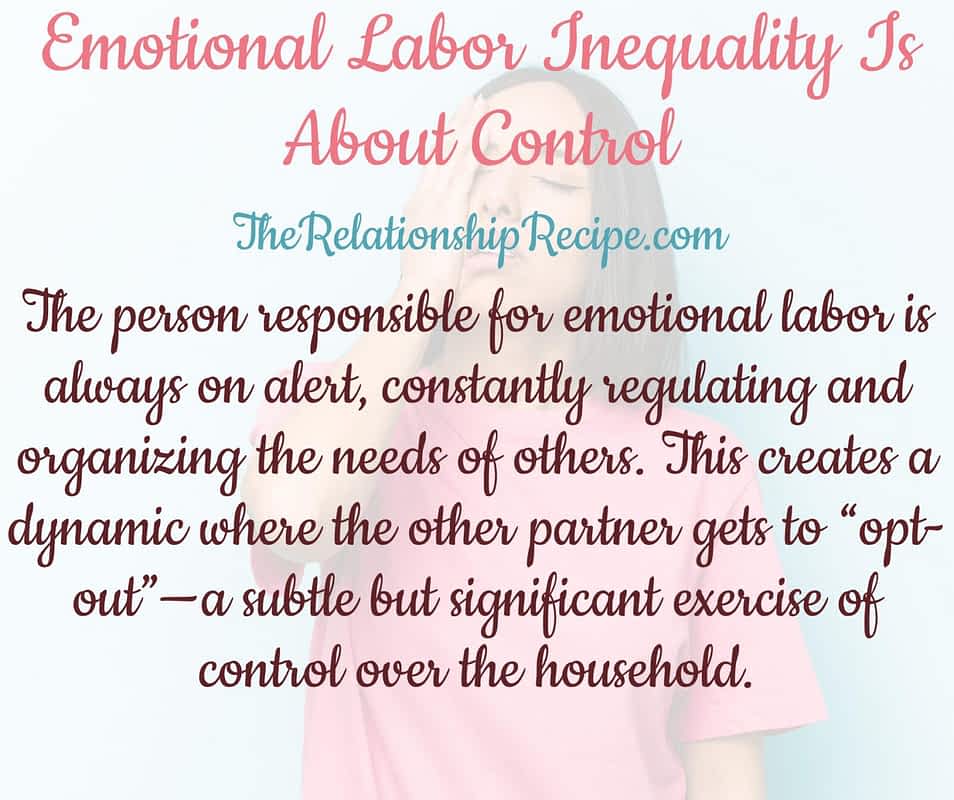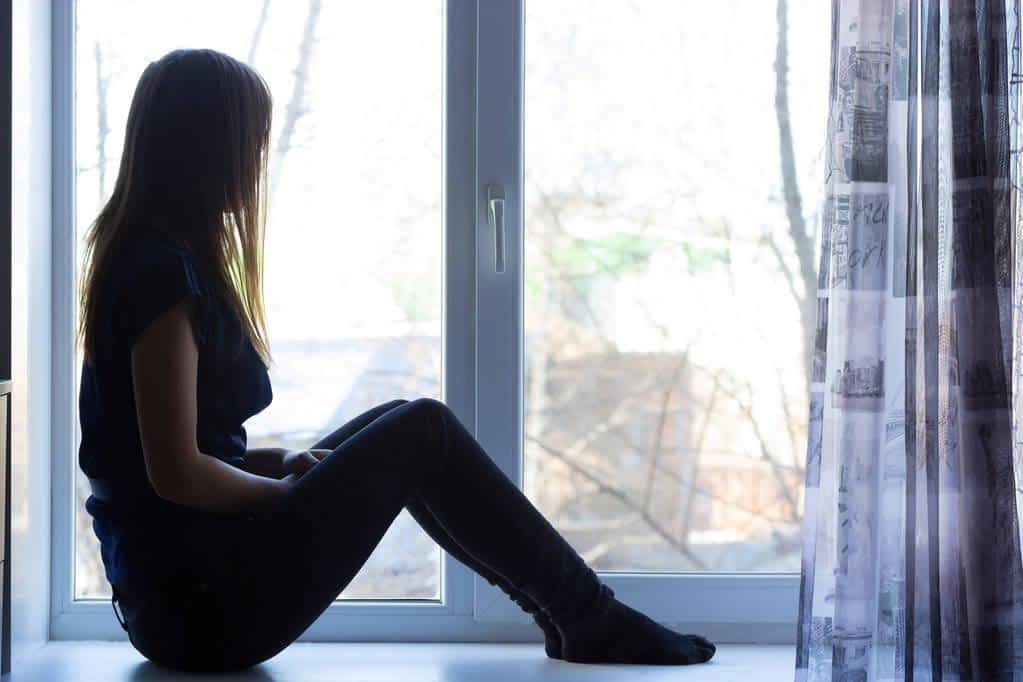The Harsh Truth About Emotional Labor Inequality for Women
Emotional labor inequality is exhausting, and it’s mostly women who are the ones paying the price. When people hear “emotional labor,” they think of little things like remembering birthdays or sending thank-you cards. Maybe even booking a dentist appointment or playing therapist when someone’s had a bad day. But that’s barely scratching the surface. What most people miss is just how deeply emotional labor imbalance runs in relationships, and how silently, it drains the hell out of the women doing it all.
This isn’t just about who empties the dishwasher or buys the birthday gifts. It’s about the constant behind-the-scenes work, the mental load, the emotional micromanaging, and the not-so-subtle control dynamics baked into all of it.
💡Key Highlights
- Why emotional labor imbalance silently wrecks relationships
- How women get stuck managing everyone’s emotions
- What “opting out” really means (hint: control)
- Why asking for help isn’t nagging- it’s demanding fairness
- How emotional labor inequality is a modern relationship deal-breaker

Emotional Labor Inequality is About Control
The person stuck with the emotional labor is basically on call 24/7. Always anticipating needs, smoothing things over, remembering who likes what for dinner and who had a rough day at work. It’s not just exhausting, it creates a messed-up dynamic where the other partner gets to casually opt out like it’s no big deal.
That quiet “checking out” is actually a subtle flex of control over the household.
Emotional labor inequality isn’t just some annoying imbalance; it’s about power. When women are the default managers of everyone’s emotions; their partner’s, their kids’, their in-laws’, they’re not just care taking. They’re running the entire emotional ecosystem of the home.
And while some people still cling to the idea that this is a “natural” or “feminine” role, let’s be real: what it really is… is unpaid, unacknowledged, and deeply tied to who holds the reins in the relationship.

They don’t have to carry the emotional or mental load because someone else (usually her) is already doing it. It’s about one partner having the luxury to emotionally clock out, while the other has to stay constantly switched on just to keep the wheels turning.
When one person gets to decide when they feel like participating (if at all) while the other doesn’t get that choice, that’s not equality. That’s control.
The partner who’s not buried in emotional labor ends up with way more freedom: freedom to relax, to disconnect, to not think about the invisible tasks that make a household and relationship function.
And here’s the sad part: this imbalance is a major reason so many women eventually hit their limit. When repeated pleas for help are ignored by checked-out, clueless husbands, some women stop asking, and start walking. That’s how we end up with “walkaway wives,” not out of nowhere, but from years of carrying what felt like the entire relationship on their own backs.

Examples of Emotional Labor Imbalance
We’ve all heard the usual list: keeping tabs on the laundry, staying on top of grocery runs, remembering to call the plumber. But emotional labor imbalance goes way deeper than just being the household task manager.
It shows up in the moments that nobody talks about, like the times she’s the one calming things down after a fight, helping her partner navigate work stress like a built-in therapist, or sensing tension brewing and handling it before it turns into a blowup. It’s anticipating everyone’s emotional state and preemptively fixing it like some kind of psychic house manager.
It’s the mental weight of knowing that if you don’t step in, things will fall apart, and worse, you’ll probably be blamed when they do. It’s suffocating.

Want a real-life example of how emotional labor is really about control? Now, let’s zoom in on something big, like a family vacation.
She books the flights, finds the perfect Airbnb, packs the kids’ bags (right down to the snacks and favorite stuffed animals), and spends hours scrolling reviews to plan fun activities for everyone. She’s basically a travel agent, event coordinator, and cruise director rolled into one.
And her partner just shows up at the airport with his phone and a hoodie, ready to “relax.” No stress, no planning – just vibes. And when she finally asks for help, his response is something like, “Just tell me what to do.” Which sounds helpful, but let’s be honest, it’s not. That just means she still has to carry the mental load of figuring everything out and delegating tasks like a manager assigning work to an intern.
That “just tell me what to do” line? It’s a sneaky, weak way to stay disengaged while pretending to be cooperative. And that, right there, is emotional labor imbalance in action.

How Emotional Labor Imbalance Creates a Gender Gap
Emotional labor isn’t just about being “nice” or keeping the peace. It’s the invisible work of managing your own emotions and everyone else’s: to smooth things over, avoid conflict, and keep life running like a well-oiled machine. And surprise, surprise: this exhausting job tends to fall squarely on women’s shoulders, making the gender gap even worse. Here’s how:
✔️Mental Load = Mental Drain
Doing all this invisible work isn’t just annoying, it’s a mental health minefield. The constant emotional juggling act leads to stress, burnout, anxiety, and sometimes even resentment. Because women are the ones doing most of this juggling, they’re also the ones absorbing most of the fallout..
✔️Workplace Vibes Manager (Whether You Like It or Not)
In the office, women are often expected to be the unofficial HR department: diffusing tension, making coworkers feel supported, remembering birthdays, and keeping everyone emotionally afloat. Meanwhile, their actual job gets put on the back burner. And yes, that definitely slows down promotions and career growth.
✔️CEO of the Household (With No Pay or PTO)
At home, traditional gender roles still run the show. Women are expected to handle the emotional upkeep of the family, like nurturing the kids, remembering in-law birthdays, keeping tabs on everyone’s moods, and being a full-time support system for their partners. It’s no wonder so many women are burned out – it’s a second full-time job that never ends.
✔️The Invisible Work Nobody Applauds
Emotional labor often goes completely unnoticed. Nobody sees it, so nobody values it. That invisibility reinforces the idea that women’s contributions (especially in emotional or caretaking roles) don’t “count” as real work. And when something’s not valued, guess what? It doesn’t get rewarded.

Emotional Labor Inequality Effects on Women’s Mental, Emotional, and Physical Health
The toll of emotional labor imbalance is brutal. Women who carry most of this invisible workload don’t just get tired, they hit a whole new level called emotional exhaustion. And no, it’s not the same as feeling a little burnt out after a long week.
This isn’t just about juggling chores or being the “perfect wife” who keeps it all together. It’s a deep, bone-weary kind of emotional exhaustion that rest can’t fix because the mental load is always there, weighing them down nonstop. This kind of imbalance doesn’t just mess with your mood; it can spiral into chronic stress, anxiety, and even depression.
It shows up physically too. Insomnia, headaches, random aches, and stress-related problems piling up like a bad credit card bill. When emotional labor is dumped unfairly on women, it’s not just a small hassle. It’s a serious health issue that doesn’t get nearly enough attention.

How Unequal Emotional Labor Affects Relationships
Emotional labor inequality doesn’t just wreck individual well-being, it slowly chips away at relationships too. When one partner feels like they’re carrying all the emotional weight, resentment builds, and communication starts to break down.
Women get caught in the worst kind of catch-22: they’re supposed to handle all the emotional labor quietly, without making a fuss. But the second they ask for a little help? Suddenly, they’re the “nag” or “overly sensitive” one.
That creates a toxic loop where women feel like they can’t win, and their partners are just cruising along, completely clueless about the imbalance they’re part of.

Women Are NOT Nags for Wanting Help
Society loves to gaslight women into thinking they’re “nagging” just for asking for a little help. But here’s the truth bomb: wanting a fair share of emotional labor isn’t nagging. It’s basic equality.
Expecting women to silently juggle everything while their partners conveniently “forget” or check out is just old-school gender roles dressed up as relationship norms. Those roles are totally outdated for today’s world.
Emotional labor imbalance doesn’t just hurt women, it drags down the whole partnership. So when women speak up, they’re not being “too much” or “demanding.” They’re standing up for their right to a relationship that’s actually balanced and fair.

How Emotional Labor Imbalance Manifests as Emotional Exhaustion
This emotional labor imbalance doesn’t just make you tired – it leads to emotional exhaustion, which is a whole different beast. It’s that draining feeling you get from constantly managing everyone else’s feelings while sidelining your own.
You become the family’s emotional barometer who is always scanning the room, tweaking your mood to keep the peace, and putting out emotional fires before anyone else even notices. Meanwhile, your own feelings get shoved to the back burner, collecting dust.
When one partner is running on empty emotionally and the other couldn’t care less or doesn’t even notice, intimacy takes a nosedive. That imbalance is like a wedge slowly pushing people apart.

What To Do About Emotional Labor Inequality
Fixing emotional labor imbalance takes actual effort from both partners. Yes, communication is important, but it has to go deeper than “Who’s taking out the trash tonight?”
Couples need to talk about emotional labor like the real, shared responsibility it is. It’s not just about who does the thing; it’s about who even notices that it needs to be done. Because remembering, anticipating, and planning is labor too, and it shouldn’t fall on just one person by default.

Equal partnerships require equal emotional investment. Period. Women shouldn’t have to hand-hold, hint, or beg their partners to step up. If you’re in a relationship, you don’t get points for showing up emotionally – you’re just doing your part.
For men, that means recognizing when there’s an emotional labor imbalance, learning to manage their own feelings like grown adults, and noticing what the family needs without waiting for a to-do list.
But let’s zoom out: emotional labor inequality isn’t just a personal failing; it’s a systemic issue rooted in outdated gender roles that tell women to “nurture” and men to “detach.” It’s old, tired, and it doesn’t work anymore.
Men need to take on emotional caregiving, not as a favor, not as a “helping hand,” but because it’s a basic requirement for being in a real, balanced relationship.

Breaking the Cycle
Seeing the emotional labor imbalance in your relationship is the first real step toward fixing it. Women deserve relationships where they’re not expected to manage every damn thing, mentally, emotionally, and physically, just to keep the wheels turning.
When emotional labor is shared equally, relationships don’t just function better – they actually feel better. We’re talking healthier dynamics, and a setup where both partners get to thrive, not just survive while one silently burns out.
Emotional labor inequality is real, and the fallout can be huge, but when we start calling it out and actually doing something about it, we give women the freedom to stop playing the role of relationship manager and start building partnerships based on mutual respect and shared responsibility.

Thank you for reading this post, don't forget to subscribe!







